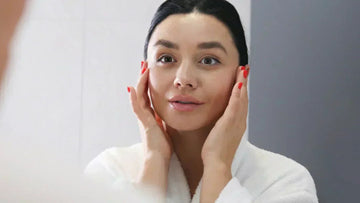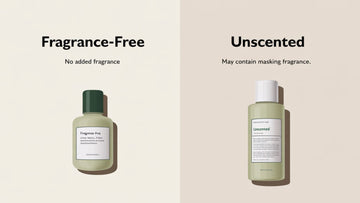Glycerin, often referred to as glycerine, is one of the most versatile and widely used ingredients in the skincare world. Known for its hydrating and moisturizing properties, glycerin for skin has become a key element in many skincare products, from face creams to serums. It is especially loved for its ability to draw moisture into the skin, leaving it soft, smooth, and well-hydrated.
In this blog, we will discuss what is glycerin used for in skincare, the numerous benefits of glycerin for skin, and the uses of glycerin in your daily skincare routine. Let’s dive deeper to explore how glycerin can help you achieve healthy, glowing skin.
What Is Glycerin Used For In Skincare?
Glycerin, also known as glycerine, is a natural humectant that attracts water to the skin's surface. It is derived from plant oils or animal fats and is commonly used in skincare products for its ability to hydrate and soothe the skin.
The primary role of glycerin for the skin is to improve moisture retention. It works by drawing water from the air and deeper layers of the skin, ensuring that your skin remains soft and plump. This makes it an essential ingredient in moisturizers, lotions, cleansers, and even soaps.
Moreover, glycerine for the skin is particularly helpful during colder months when the skin tends to lose moisture. Its lightweight texture ensures that it doesn’t feel heavy or greasy, making it suitable for both oily and dry skin types.
Benefits Of Glycerin For Skin
When it comes to achieving healthy and glowing skin, the benefits of glycerin for skin are numerous. Here are some of the key benefits:
-
Intense Hydration
Glycerin is a powerful humectant, which means it attracts moisture to the skin and keeps it hydrated. This makes it ideal for people with dry skin. By locking in moisture, glycerin for face skin prevents dryness and flakiness, leaving your skin soft and supple. -
Improves Skin Barrier Function
One of the significant benefits of glycerin for the skin is its ability to strengthen the skin's barrier. A healthy skin barrier prevents water loss and protects the skin from environmental damage, such as pollution and UV rays. -
Smooths and Softens Skin
Glycerin not only hydrates but also softens and smooths rough or uneven skin texture. Regular use of glycerine for skin ensures a smoother and more even complexion. -
Soothes Irritated Skin
If you have sensitive or irritated skin, glycerin can be your best friend. Its gentle and soothing properties help calm redness, itching, and inflammation, making glycerin face skin perfect for sensitive skin types. -
Promotes Skin Healing
Glycerin aids in the repair of damaged skin by accelerating the healing process. It is particularly beneficial for conditions like chapped lips, cracked skin, and minor wounds. -
Anti-Aging Properties
By keeping the skin hydrated and plump, glycerin helps reduce the appearance of fine lines and wrinkles. Well-hydrated skin looks younger and more radiant, which is why glycerin for skin is often included in anti-aging products.
Uses of Glycerin
The uses of glycerin in skincare are varied, and it can be incorporated into your routine in multiple ways. Below are some effective ways to use glycerin for your skin:
-
As a Moisturizer
Mix a few drops of glycerin with your regular moisturizer or aloe vera gel and apply it to your face. Glycerin for face skin locks in moisture and leaves your skin hydrated for hours. -
As a Toner
Add a small amount of glycerin to rose water to create a natural and hydrating toner. Apply it after cleansing your face to soothe and refresh your skin. -
As a Lip Balm
Glycerin can work wonders for dry or chapped lips. Apply a thin layer of glycerin to your lips before bed for soft, smooth lips in the morning. -
For DIY Face Masks
Glycerin can be used in homemade face masks. Mix glycerin with honey and a few drops of lemon juice to create a nourishing and brightening face mask. -
To Treat Cracked Heels
Combine glycerin with lemon juice and apply it to your cracked heels. Leave it on overnight for soft and smooth feet. -
As a Makeup Primer
Glycerin can act as a natural primer, creating a smooth canvas for makeup application. Apply a thin layer of glycerin on your face before makeup to ensure it lasts longer.
FAQs About Glycerin For Skin
1. Can Glycerin be used on all skin types?
Yes, glycerin is suitable for all skin types, including dry, oily, and sensitive skin. Its lightweight and non-greasy texture makes it perfect for oily or acne-prone skin, while its hydrating properties benefit those with dry skin.
2. Can glycerin cause skin breakouts?
Glycerin itself is non-comedogenic, meaning it does not clog pores. However, if used in excess or combined with heavy oils, it may lead to breakouts in some individuals. It is always best to do a patch test before using glycerin.
3. How should I incorporate glycerin into my skincare routine?
Glycerin can be incorporated into your skincare routine in several ways. Use it as a moisturizer, toner, or DIY mask ingredient. You can also mix it with your favorite serum or lotion for added hydration.
In conclusion, glycerin for the skin is a versatile and essential ingredient for achieving healthy, hydrated, and glowing skin. Whether you use it as a moisturizer, toner, or treatment for dryness, the benefits of glycerin for skin are undeniable. By incorporating the uses of glycerin into your skincare routine, you can enjoy smooth, soft, and radiant skin all year round. So go ahead, give glycerin for face skin a try, and experience the magic of this powerful ingredient!






